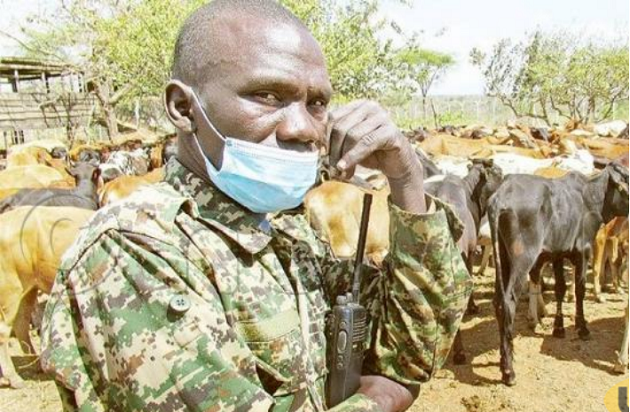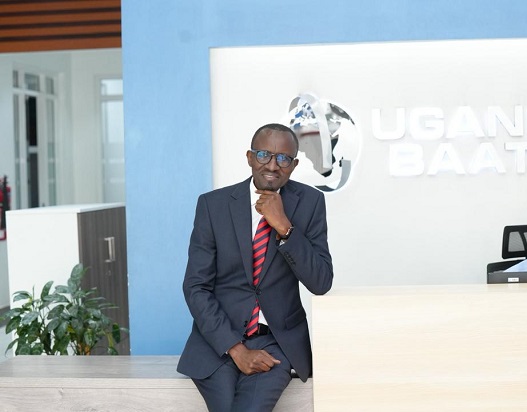A UPDF soldier guards a herd of cattle in Karamoja. There had been a resumption of cattle raids. The government has resumed disarmament exercise in Karamoja
Uganda and its neighbors have been asked to make laws to criminalize cattle rustling despite traditional attitudes. Researchers say while cattle rustling has been widely viewed as a cultural issue practice, the reality is that it is another form of transnational organized crime.
The Head of EU Foreign Policy Instruments Regional Team in Nairobi, Ignacio Burrull said there is a growing threat of cattle rustling as a form of transnational organized crime as well as its connection to other forms of crimes such as arms trafficking.
“Cattle rustling and theft casts a spotlight on livestock theft as an emerging security challenge. It calls for fresh analysis and solutions to the growing phenomena of cattle rustling,” Said Burrull in a virtual seminar on cattle rustling.
According to studies by ENACT, cattle rustling has for long been viewed as an acceptable practice. “And to the communities, this is something very normal to them except that they are now losing life. But without losing life, they are comfortable doing it” reads one of the findings.
ENACT is an EU funded project implemented by the Institute for Security Studies and INTERPOL, in affiliation with the Global Initiative against Transnational Organised Crime.
The project is pushing for revitalization of a protocol adopted by East Africa Police Chief Organization (EAPCO) to fight cattle rustling.
The protocol popularly known as Mifugo Project was launched by EAPCO and the Institute for Security Studies in 2008. It was supposed be used to prevent, combat and eradicate cattle rustling.
It was however not implemented due to lack of funding. Only Uganda has so far signed and ratified the protocol. Cattle rustling occurs when ‘a group of individuals plan, organise and steal livestock forcefully from another person or from the grazing field or kraal for the purpose of commercial gain.
That cattle rustling includes components like a nexus between illicit business and political power. Money from trade in illicit military grade arms and ammunition is lubricating the world of cattle rustling.
“A lot of times, cattle are bought in cash. And then that cash is moved. Buying cattle holding them and waiting to sell them to the abattoirs is a very good way to launder any money that they have acquired to other illicit activities” said
The rise of transnational rustling goes hand in hand with the rise in transnational trade in military weapons.
“The manufacture of bullets by certain governments like the Kenyan government which has a bullet factory in Eldoret. The smuggling of those bullets fueled the possibility of using the guns even more” said one of the activist from Kenya
“So it is quite easy to access bullets from Ethiopia, from Somalia, we used to see a lot from Sudan and Uganda. Though the Ugandan one, they have done a lot from their said. We also need to do a lot from our side” Cattle rustlers reportedly exchange a number of head of cattle for guns. The more sophisticated the gun, the more cattle are paid by the rustlers.
Why Uganda Is taking lead in Criminalization Cattle Rustling
The experts are urging Kenya and other countries in the horn of Africa to take a leaf from Uganda if they are to combat transitional cattle rustling.
A Senior Chief State Attorney, at the Office of the Director of Public Prosecutions, Lillian Alum said the law in Uganda criminalizes cattle theft and cattle rustling.
“our laws differentiate between cattle rustling and cattle theft. And they are both punishable. For cattle theft, if you are prosecuted and convicted for the first time, you are convicted to a maximum punishment of seven years” revealed
Alum says for cattle rustling, the law provides that the theft must have been committed by one community against another. And there must be a movement from one community to another.
She says the army has also been deployed in Karamoja and along the borders with Kenya and other countries to prevent cross-border cattle rustling.
She says while the government in Uganda had disarmed the Karamojong, cattle raiding has resumed with arms flowing in from neighbors like South Sudan, Kenya and a far as Ethiopia.
Alum says the revitalization of the Mifugo protocal can help Uganda to jointly fight cross boarder cattle rustling between the Karamojong and Pokot in Kenya.
Martin Ewi, ENACT Regional Coordinator for Southern Africa says the 13 police chiefs from East African Police Chiefs are expected to consider the reviewed Mifugo Protocol mid this month.
He says there is urgent need for a common stand against militarization of cattle rustling and to end whet eh calls senseless killings.
“ Cattle rustling has evolved from cultural practice to one of the revenue generating crimes. It is increasingly being searched for by organized crime syndicates and organized crimes groups” he said
There is hope that market controls would ensure only honest pastoralists profit from their cattle rather than organised criminals.
-URN





